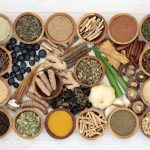12 science-backed Ayurvedic herbs and spices with POWERFUL health benefits
 (NaturalHealth365) Ayurveda is a traditional system of medicine that originated in India and is more than 3,000 years old. It is an all-natural modality, using herbs and spices to prevent diseases and health conditions from developing in the first place. By taking a whole-person approach, it focuses on balancing mind, body, and spirit for better health.
(NaturalHealth365) Ayurveda is a traditional system of medicine that originated in India and is more than 3,000 years old. It is an all-natural modality, using herbs and spices to prevent diseases and health conditions from developing in the first place. By taking a whole-person approach, it focuses on balancing mind, body, and spirit for better health.
In fact, many Ayurvedic herbs have been studied extensively and now have solid scientific backing as effective remedies for many health conditions.
Ayurvedic herbs can improve your health in multiple ways
Ashwagandha
Several studies have shown that ashwagandha promotes healthy cortisol levels and normal inflammatory processes that occur in response to stress. Cortisol is called the “stress hormone.” By supporting a healthy stress response, ashwagandha can help lower levels of anxiety and improve sleep quality for people who suffer from anxiety and stress.
Bitter Melon
Bitter melon supports normal blood sugar levels and boosts insulin secretion, which is the hormone that stabilizes blood sugar levels. According to research, this tropical vine is not only a good remedy for blood sugar problems, but it is also packed with antioxidants and nutrients.
Boswellia
This herb, also called Indian frankincense, is a potent anti-inflammatory, but research has also shown that it is very effective for reducing pain. Studies also show that Boswellia improves range of motion and mobility, especially in rheumatoid arthritis and osteoarthritis patients. It also helps prevent gingivitis and oral infections.
Brahmi
Studies have found that Brahmi can improve memory, learning rates, information processing, and attention. It is also effective in treating ADHD symptoms such as restlessness, lack of self-control, and impulsivity.
Cardamom
This “queen of spices” has powerful scientific data recognizing it for its ability to maintain normal blood pressure. Besides supporting blood pressure, inhaling the essential oil also helps to boost oxygen uptake in the lungs during a strenuous activity like exercise.
Cumin
Studies have shown that this earthy spice provides many health benefits, including boosting digestive enzyme activity. It promotes faster digestion by speeding the release of bile in the liver. In addition, cumin also helps ease fat digestion and relieves symptoms of IBS such as bloating and abdominal pain.
Gotu Kola
Also called the “herb of longevity,” gotu kola is very effective at relieving anxiety symptoms. According to one study, it also reduced stress and depression when subjects took gotu kola instead of antidepressants for 60 days.
Licorice Root
Licorice root has several healing properties, and there are plenty of studies to back it up. For example, it reduces inflammation and helps to protect the body from bacteria and viruses. It is also beneficial when dealing with upper respiratory infections.
Triphala (amla, bibhitaki, and haritaki)
The Ayurvedic remedy triphala is a combination of three medicinal fruits: haritaki, bibhitaki, and amla. This mixture is often used to ease constipation and decrease inflammation that is caused by arthritis. Studies have also shown that it limits the growth of certain cancer cells and may even prevent them.
Turmeric
Turmeric is a well-known spice and herbal remedy that is one of the rare substances embraced by practitioners of Western medicine. This is because of the abundance of scientific support that shows its effectiveness as an anti-inflammatory. In fact, it has been shown to be just as effective as some drugs used to reduce inflammation – but without the unpleasant side effects.
Incorporate natural remedies into your lifestyle for their mighty benefits
Many natural remedies work just as well as conventional drugs but don’t have harmful or unpleasant side effects. However, before beginning a new supplement routine, including herbal remedies or Ayurvedic medicine, talk to your healthcare provider to ensure you won’t encounter any allergic reactions or drug interactions.
The beauty of these natural treatments is that they can be taken in supplement form, but many can be made into teas or used to flavor your favorite foods. Their versatility makes it easy to incorporate them into your lifestyle.
Sources for this article include:



